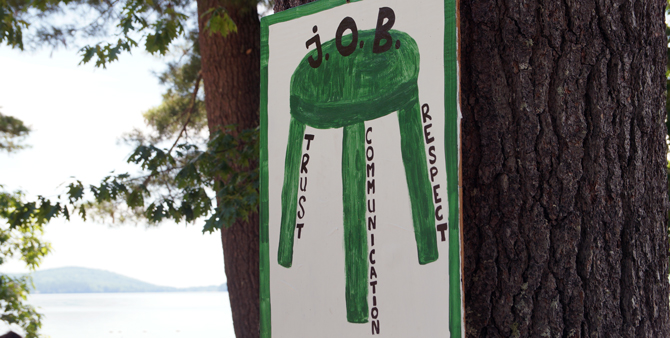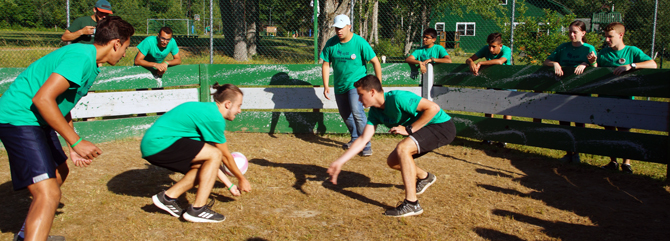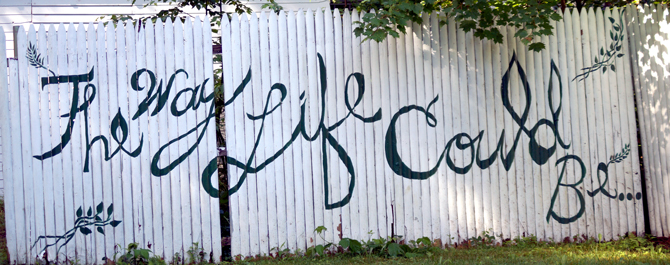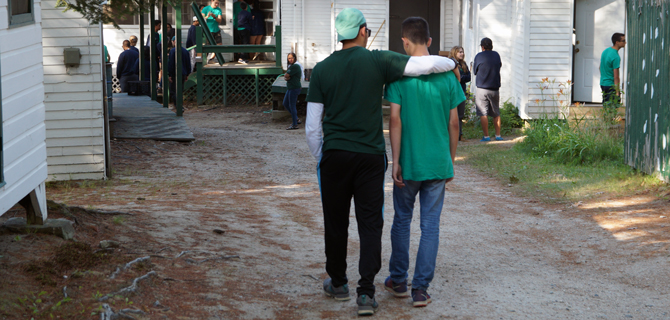Seeds can meet in the field, or become a champion in the pit; they can get raggedy and trust the process; take it back to dialogue or get on the bus.
While each Camp session has its own set of lingo, inside jokes, and chants, there are a few cherished phrases that have lasted through the years, usually for their ability to perfectly sum up an element of the Seeds of Peace experience.
Like grasping knots on a rope that stretches from one session to the next, learning these phrases brings campers closer to understanding the transformations and bonds that all the Seeds before them have shared. But for those who haven’t attended Camp or a Seeds of Peace event, some of the phrases can seem peculiar.
As applications open for 2019, we wanted to give an insider’s peek to some of the lingo future Seeds might hear around Camp, and help demystify what parents might hear their kids talk about afterward.
Many of these phrases are not original to Seeds of Peace, but each holds a special meaning for the organization. Below is a quick guide to some of these words and phrases:
CAMP CULTURE
1. The Field: Inspired by the Rumi poem “There Is a Field,” which speaks to a place beyond the narratives we’ve been given and moral codes we come from, this phrase refers literally to Camp, as well as the work that Seeds of Peace is doing. Camp is the field, a gray area between the binaries of right and wrong, and an experiment of the future that we’re trying to build.
2. The Stool: There’s a drawing of a three-legged stool posted on a tree where it can be seen by all the campers at every lineup (the time before each meal when campers come together for announcements, news and presentations). The legs represent respect, trust and communication. The seat can represent anything—your job, your community, your family, etc.—and all three legs are necessary to hold it up. Take away respect, trust, or communication, and the whole stool falls over.

3. The Pit: There’s no deep meaning here, just a place where gaga, a high-energy game involving a soccer-sized ball, takes place. Morning lineups usually include an announcement of who won the previous night’s games, and therefore have entered the pit of champions. Its mention is always answered, one fist pumping in the air, with chants of: “The pit! The pit! The pit!”

CAMP APHORISMS
4. Do Whatever You Can, With Whatever You Have, Wherever You Are: Wil Smith, a beloved Camp staff leader who died in 2015, would often use this phrase to remind campers that they don’t have to solve all the world’s problems in a day. Today, it is still used to encourage Seeds to focus on doing what they can to address the issues right in front of them.
5. The Way Life Could Be: A take on the Maine state slogan, “The Way Life Should Be,” this phrase reflects the experimental community that is built at Camp, and the hope that the relationships formed here can be replicated in places of conflict.

6. If You Ain’t on the Bus, You Ain’t on the Bus: This phrase serves two purposes. As a matter of practicality, it’s used to encourage campers to be on time ﹘ it literally means to be on the bus at the directed time or risk getting left behind. But it is also used metaphorically: If you don’t put in the work at Camp, you risk getting left behind by those who are moving forward around you.
7. It’s About the J-O-B: Teens have a job when they come to Camp—to connect, to learn from one another and to engage in direct and meaningful ways. When situations get hard, or campers try to avoid the work done in Dialogue Sessions, this phrase serves as a reminder of the greater purpose of why everyone is at Camp.
8. Refill the Cup: This proverb is usually intended for the adults in our educators’ programs, who are often in positions of constantly giving themselves to their work and those around them. While this selflessness may be second nature, the phrase reminds us that a cup that isn’t refilled from time to time will eventually be drained, and it’s necessary to implement restorative practices in service of yourself and others.
9. Two Ears, One Mouth: You’ve likely heard this phrase before, as in, “You have two ears and one mouth for a reason.” It emphasizes that the ratio of having two ears and one mouth is a biological reflection of the importance of listening, and hits at the core of our belief that communication is more about truly hearing each other than it is about speaking.
DIALOGUE MAXIMS
10. Get Raggedy: Being or getting raggedy is about speaking honestly from personal experiences without preparing or trying to sound smart in a certain way. This is often said to encourage participants in dialogue to open up and extend themselves to others.

11. Comfort, Stretch, and Panic Zones: Based on the model developed by experiential education specialist Karl Rohnke, this refers to the three areas of learning.
The comfort zone is where rejuvenation and a lot of joy happens, but there is no impetus to learn or grow because you already know what to expect.
In the panic zone, conversation is so uncomfortable that it’s hard to engage and listen; your fight-or-flight instincts kick in, and the brain stops functioning as it normally would.
The stretch zone, while not comfortable, is the sweet spot. This is where the most learning and growth takes place, and therefore we try to place campers here as often as possible, be it through trying new activities, taking on tough conversations in dialogue, or reaching out and saying hi to a new person.
12. Take Space, Make Space (a.k.a. Step Up, Step Back): This phrase is a reminder to think about how much we are contributing to a conversation and to adjust accordingly. If you realize you have a tendency to talk a lot in conversation (i.e. take up a lot of space), consider challenging yourself to take time to listen, therefore making space for someone else to speak. On the flip side, if you are one to normally hold back, this encourages you to push yourself to speak up.
13. One Diva, One Mic: Often used as a group norm in dialogue, this phrase, in a nutshell, means to speak one at a time.
14. Tell the Plot, Leave Out the Characters: Some of the most important takeaways in Dialogue come in the form of personal stories. There may be times for many campers when a story told in Dialogue is useful for upsetting a narrative—e.g., “My friend has experienced police brutality, so I know that these things do happen”—but it’s also important to maintain the storyteller’s confidentiality and not give their names.
15. Don’t Compare Your Pain: This idea refers to recognizing that everyone in a Dialogue group holds things that cause pain and that are not in service to them. If we’re comparing pain in a way that keeps us from being honest or sharing openly—either by withholding information because a person feels that their pain isn’t bad enough to merit sharing with the group, or by saying that person’s pain is less than their own—we’re not doing ourselves or the group any good.
16. Take It Back to Dialogue: Campers often reach out to counselors and facilitators when a Dialogue-related issue arises outside the Dialogue Hut, or a person leaves a session feeling like there’s something else they wanted to talk about. But they are always encouraged to “take it back to Dialogue”—meaning that the most effective way to deal with the issue is to discuss it head on with their Dialogue group.

17. Trust The Process: The important lesson here is trusting that you are in a process. When things get difficult in Dialogue, campers are reminded that this hard work is part of their process for learning, growing, and becoming the person they want to be. It’s also an important part of being in a group: As a group we will have conflict, and we need to trust that we’ll move through it—perhaps some individuals will do so at different speeds—but that it’s all part of the process.
Did we miss something? Let us know your favorite phrases from Camp (and what they mean) in the comments below!

